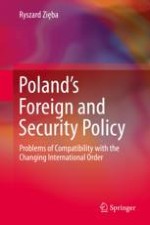2020 | OriginalPaper | Buchkapitel
9. The Evolution of Poland’s International Roles
verfasst von : Ryszard Zięba
Erschienen in: Poland’s Foreign and Security Policy
Aktivieren Sie unsere intelligente Suche, um passende Fachinhalte oder Patente zu finden.
Wählen Sie Textabschnitte aus um mit Künstlicher Intelligenz passenden Patente zu finden. powered by
Markieren Sie Textabschnitte, um KI-gestützt weitere passende Inhalte zu finden. powered by
